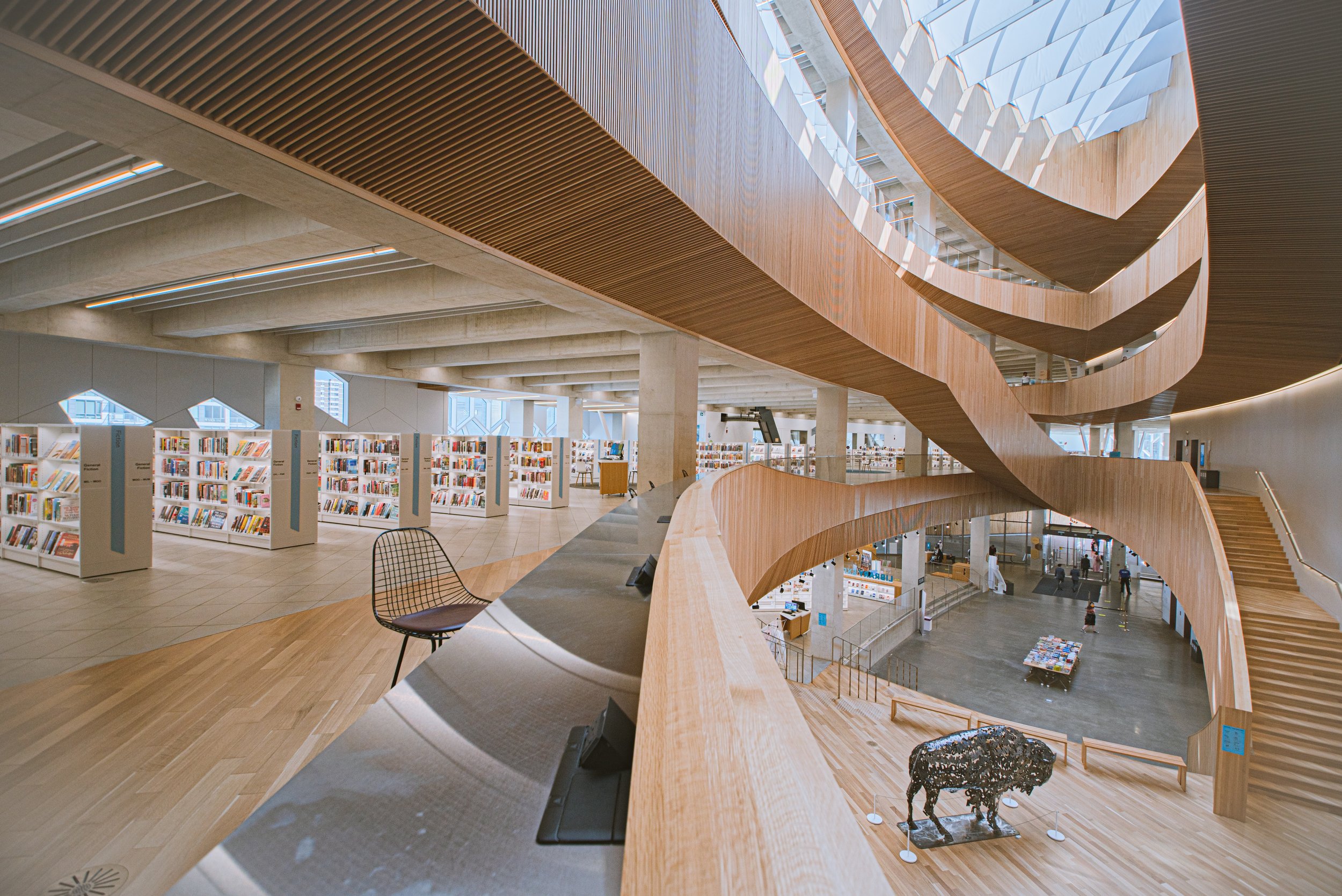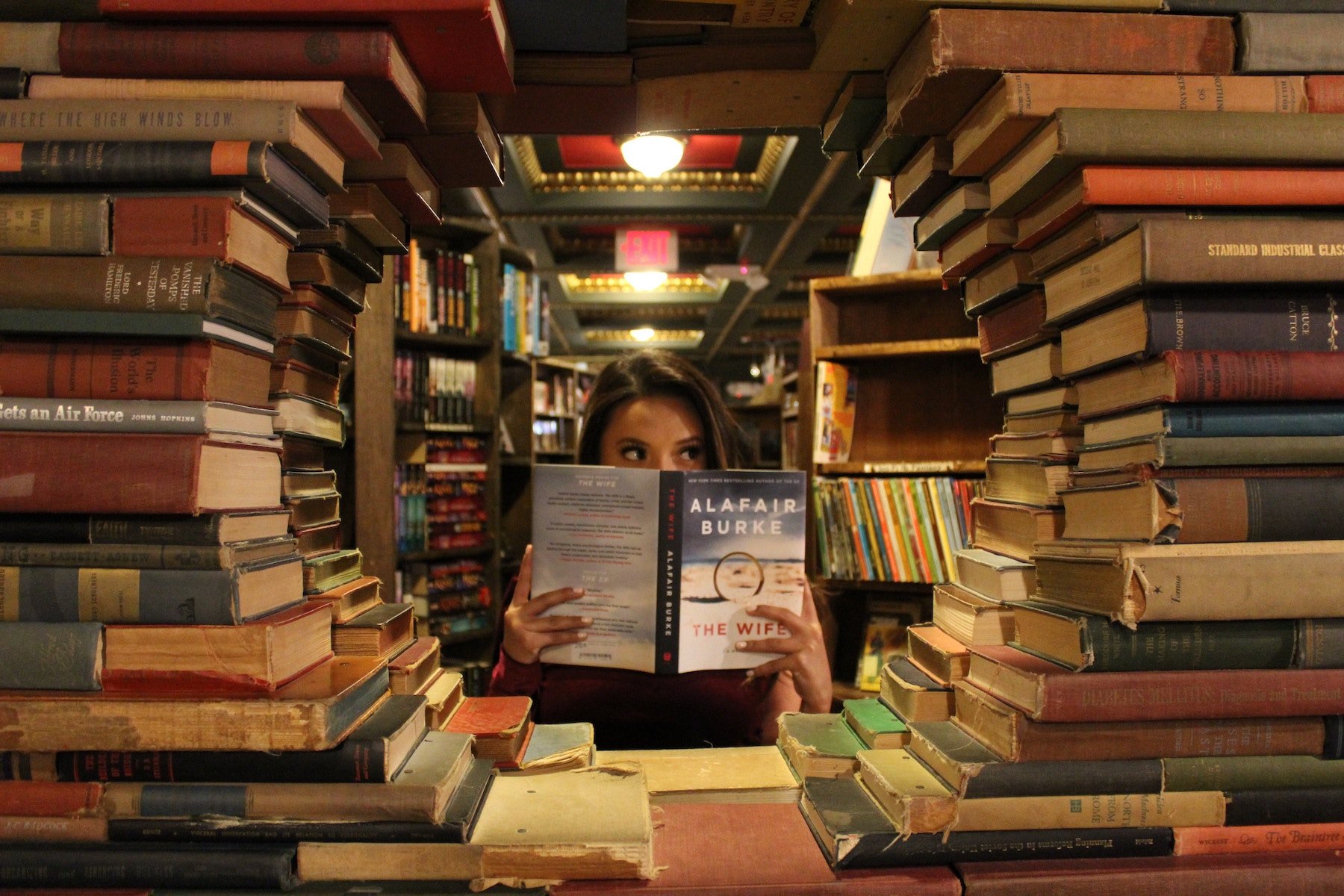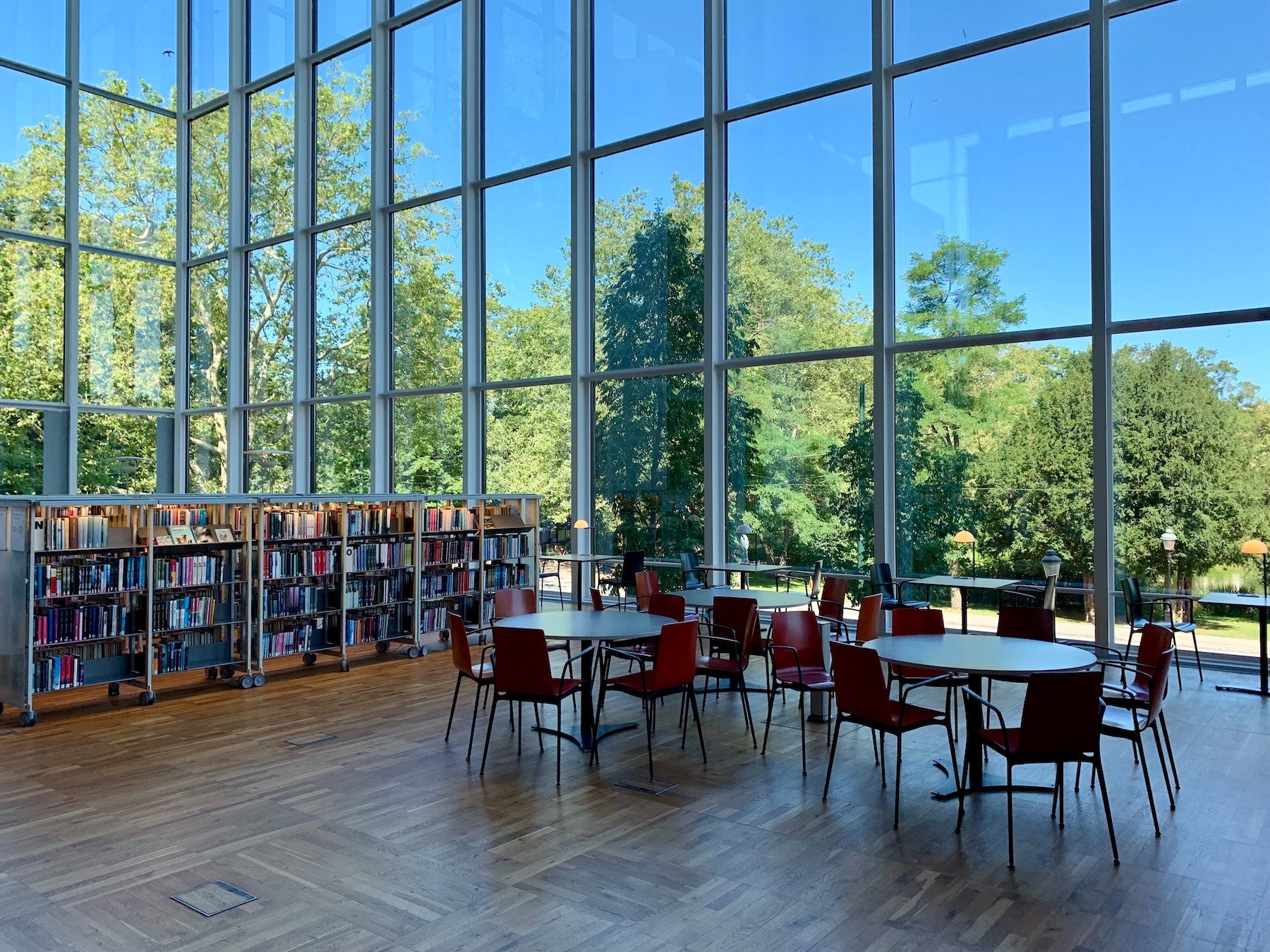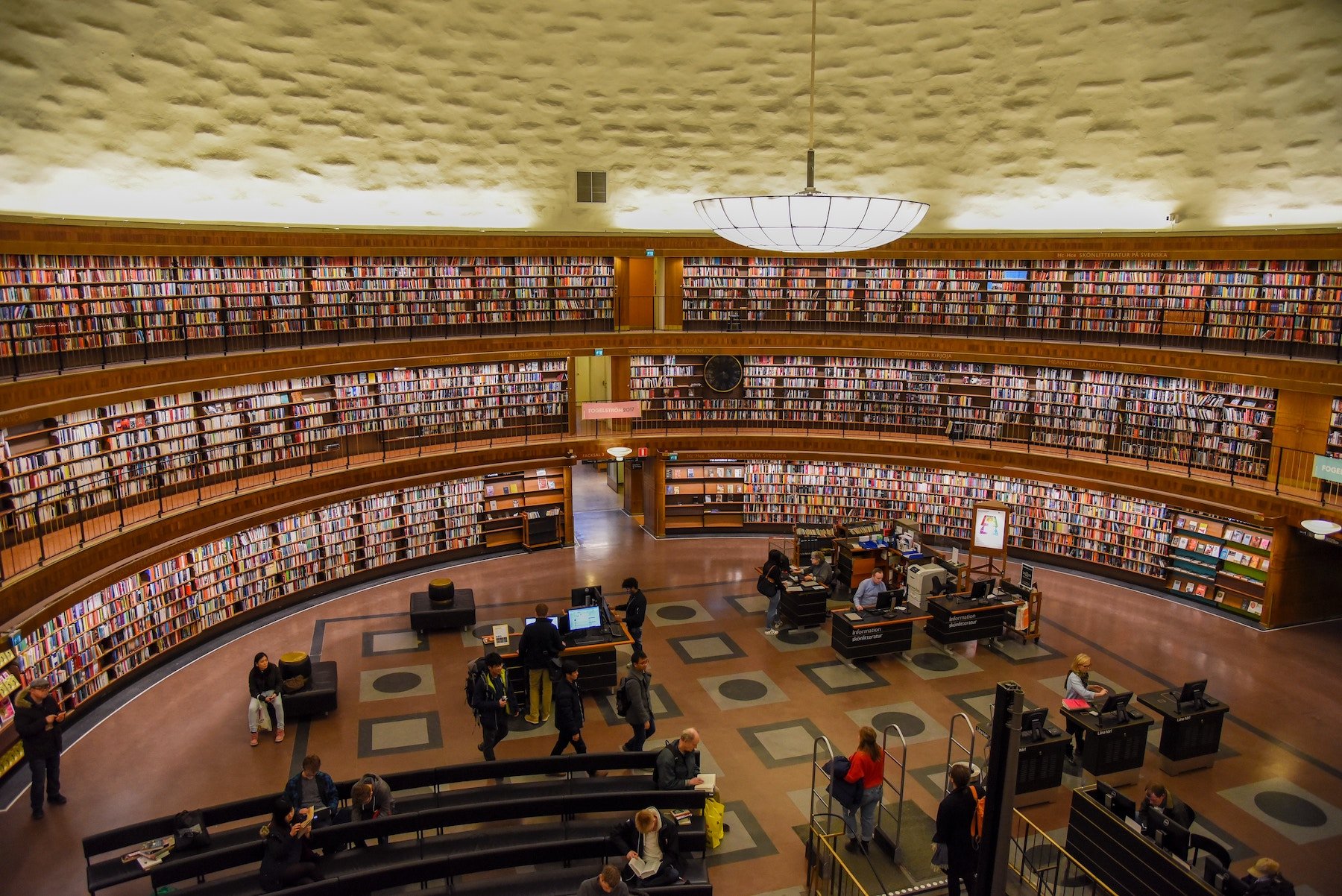Community for word nerds
I step curiously amidst the hushed murmurings of voices I do not know, in this gathering space where we are all free to ignore one another, sharing a friendly silence. The only sound piercing our collective hush is the exuberant exclamation of the four-year-old running towards a cheerfully decorated end-cap asking, “Mommy, can we get one more?” I’ll never know if he gets his wish because I’m having the same conversation with myself. My left arm is already cradling a dozen discoveries of my own, yet my right hand is still hungry, fingertips walking the spines of titles that promise intrigue, information, and inspiration.
Nowhere else in our society is so much goodness given so freely. In this palace for the people, all are welcome to come as they are and to leave with whatever uplifts them.
Do you love libraries as much as I do? During the COVID-19 lockdowns, I could count on one hand the number of buildings I went in, and if it didn’t sell food or provide medical care, it wasn’t on the list. One of the places I missed the most were oases of readerly delight: libraries and bookstores.











The first time I fully felt the power of these houses devoted to pages was when I was a high schooler and my friend Sara suggested that we take poems we’d been writing to the open mic poetry night at our local Barnes & Noble. Marooned in suburbia, this (and the other chain, Borders, a mile away) were the only bookstores available to us, and we were drawn to them like nerdy kids to a Scholastic Book Fair.
Sitting in our metal folding chairs, waiting for our turn to stand in front and read our poems, my heart beat like a bass drum and when I was done, I felt at least 37% more grown up. These afternoons and evenings at the bookstore reveling in poetry with my friend Sara became some of my favorite teenage memories, weaving together the experience of friendship with the experience of falling in love with beautiful words.
Since I neither lived near a public library nor knew how to get a library card (and was too shy to ask, #immigrantlife), that Barnes & Noble + Borders combo became my quasi-library wonderland. Lacking the money to buy and take home what I wanted, I took full advantage of their generous browsing-and-squashy-armchair-sitting permissions. I spent endless afternoons carefully turning the pages of books about poetry, psychology, relationships, recipes, art, and magazines of all kinds, simply because I could. Did you ever do this too??
I recently finished a beautiful book about how social infrastructure — such as libraries, parks, community gardens, free courtyards, athletic fields, sidewalks, playgrounds, public schools, and walkable business districts can reduce inequality, polarization, and civic disengagement. It’s by Erik Klinenberg and it’s called Palaces for the People, after the famous quote by Andrew Carnegie who used his robber baron riches to build over 2,500 public libraries around the world (try to imagine Bezos doing that). If you're looking for a good book that will make you crave more time between the stacks of your local library and encourage you to do more to improve your local community, I recommend grabbing it from your local bookstore, Bookshop.org, or your local library.
Want to learn more …but without reading? Then check out these two podcasts instead:
99% Invisible, episode Palaces for the People
This American Life: The Room of Requirement
Book Club /Podcast Discussion Guide
If you check out the podcasts or choose to read Palaces for the People with your friends or book club, here are a few conversation starter questions to kick off a discussion:
What are your early memories of libraries?
What role have libraries played at different stages of your life?
Have books been primarily a solo indulgence for you, or something you’ve shared with friends and community?
What are the places — physical and digital — that have delivered the most friendship and community into your life?
What places do you frequent where you’re most likely to interact with people who are very different from you? What places allow you to cross paths with people from different walks of life?
Have you ever volunteered with your local library or literacy programs? If so, what was it like?
What are three books that you think everyone should read and why?
Tips on starting a book club
The challenge with most book club book recommendations is that no book is universally loved by all people. My #1 recommendation might just be meh for you, and vice versa. And life is short, so spending time reading a book you don’t like feels like wasting irretrievable moments of your precious sparkly life. So if you’re wondering how to start a book club — my suggestion is to first throw away the idea of a traditional book club structure and instead consider the possibilities of what could happen when you gather people together to each sharing about the books that make you come alive.
I suggest trying the “any book book club” format, since it’s the most inviting, the most flexible, and the least demanding. Book clubs don’t work for a lot of folks (me included!) because:
A) People don’t like being told what to read
B) People don’t finish the book in the assigned time (or they feel a lot of pressure to get it done which robs some of the joy away from reading)
C) People feel pressured to say that they liked a book that they actually think should be chucked into the fireplace, because they don’t want to hurt the feelings of the person who suggested reading it.
The beauty of an Any Book Book Club is that everyone gets to read whatever they want, and then when you get together for your sessions, each person shares about the book that they reading, why are they really like that, what they're getting out of it, but maybe it's frustrating or what’s not working for them about it. It's a way for each other to learn about a wider variety of books, and also to understand each other more deeply as people by understanding what you’re each loving (or not loving!) about the different kinds of books that you’re reading.
Sure, later on, you could decide to try reading the exact same book together then discussing it. But let that that be an option on the menu and not a strict requirement. And even if you choose to go with the more liberatory format of an Any Book Book Club, consider holding your structure loosely enough to allow members to bring and share more than just discussions based on books—talk about life, love, jobs, the things that make your heart happy, and the worries that keep you up at night. Lauren Capelin did this, and it gave her six wonderful long-lasting friendships. You can do it too (I believe in you!)
Alternatives to book clubs
Article Club
If you like the idea of a book club, but you're not the type to actually make it through an entire book in two to four weeks, there's a bunch of different alternatives that you can try that get at the same group experience, but the bar to entry is a lot lower. You could start an article club! Works just like a book club, but instead of having to commit to an entire lengthy novel or nonfiction tome, everyone just has to read the same article. These are great because articles can range in length from five minutes of reading to 97 minutes of reading (I’m looking at you, The New Yorker.) And because the reading commitment is a lot shorter, you can actually have group meetings more frequently, in case you're wanting to do some thing on a weekly basis as opposed to a monthly basis. Because articles are shorter and easier to consume, there's also get to the opportunity to try out a wider variety of different topics in a short amount of time. Efficiency for the win!
Video Club
A video club is another tweak on the “alternative to book clubs” format. Works just like a book club and an article club, but instead of needing to read, you just use your eyes and ears to consume videos, and then discuss them together as a group afterwards. You could start with a short 5-15 minute videos that you find on YouTube, or mini documentaries, or short series, or you can take it all the way up to a full-blown film club and discuss full-length cinema together. Just like with book clubs and article clubs, share the video-selection duties, allowing each person to suggest videos for future discussions.
Podcast Club
You see the pattern here, right? It works…you guessed it… just like a book club, and an article club, and a video club…except with… podcasts! 😆 You and your homies select one or more podcasts to discuss together in your get togethers. Rotate podcast-picking duties, and then voila. You listen to podcasts, then gather to discuss. If you want to try this out but you’re feeling too lazy or too busy to organize it yourself, just join Podcast Brunch Club! Each month they assign a theme and playlist of selected podcasts. You listen to as many podcasts in the list as works for you. Then join the pre-selected meeting times to discuss the podcasts with people all around the world, or right there in your local neighborhood.
Fight Club
You get together and punch each other and try to take down capitalism at the same time. Ok, this one’s a joke. 🧼
Surely those are enough ideas to get you started on the path of connecting with good people in your life, through the love of words, ideas, and the beauty of shared community. Let me know which idea you tried and how it went!
XO
Kat
